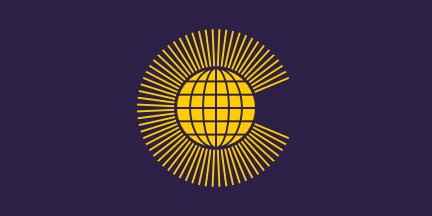 by Dean Thomas, 31 March 2004
by Dean Thomas, 31 March 2004 
Last modified: 2005-12-31 by rob raeside
Keywords: british empire | commonwealth of nations | commonwealth games | international organization |
Links: FOTW homepage |
search |
disclaimer and copyright |
write us |
mirrors
See also:
Mark Sensen, 27 July 1996
The members, on 1 December 1996, were: Antigua and Barbuda, Australia, the Bahamas, Bangladesh, Barbados, Belize, Botswana, Brunei, Cameroon, Canada, Cyprus, Dominica, the Gambia, Ghana, Grenada, Guyana, India, Jamaica, Kenya, Kiribati, Lesotho, Malawi, Malaysia, Maldives, Malta, Mauritius, Mozambique, Namibia, Nauru (special member), New Zealand, Nigeria (suspended), Pakistan, Papua New Guinea, St.Kitts and Nevis, St.Lucia, St.Vincent, Seychelles, Sierra Leone, Singapore, Solomon Islands, South Africa, Sri Lanka, Swaziland, Tanzania, Tonga, Trinidad and Tobago, Tuvalu (special member), Uganda, United Kingdom, Vanuatu, Western Samoa, Zambia, Zimbabwe.
Mark Sensen, 27 July 1996
The Commonwealth describes itself as an association of states that have experienced direct or indirect British rule or have been otherwise administratively linked to another Commonwealth country, with the exception of Mozambique which was admitted in recognition of its contribution to the struggle against apartheid in South Africa.
Jonathan Makepeace, 27 April 2005
The Commonwealth of Nations is listed on the Guinness Book of Records as the World's largest political alliance.
The Commonwealth of Nations is an evolving entity from the old British Empire. While some regard the Commonwealth as an anachronism, the ties to "the old country" has kept the movement going, as shown by the Commonwealth Games, which are held every four years. Mozambique was the first non-former-British Empire nation admitted to the alliance in the last decade of the 20th century.
At 15:21 21/04/2003 -0000, J. Patrick Fischer wrote: In flags@yahoogroups.com,
Nathan Lamm wrote: Are there any other members of the Commonwealth that were
not British colonies at some point? On the other hand, what nations that
were British colonies are not? I can think of the US, Ireland, and Arab nations
(and mandates like Israel), as well as pre-modern period possesions in France,
Central America, and so on.
Santiago Dotor replied: Namibia (1884-1920: German Protectorat, 1920-1990:
South African Protectorat).
Sorry for the rather NFR nitpicking but am I wrong in believing that South
West Africa (SWA) was a League of Nations, later UN, *mandate* (not quite
the same as a protectorate) from 1920 to 1966, and after that an occupied
territory?
Dean Thomas replied: South Africa wanted to incorporate SWA into it's territory after World War 2, but the United Nations did not want this to happen. South Africa did not want SWA placed under the UN trusteeship system so it said that the territory would continue to be administered under the original League of Nations Mandate. The UN declared an end to the mandate in 1966 - which south Africa ignored until 1990.
At 17:27 21/04/2003 +0100, Jorge Candeias wrote: Part of Cameroon,
too, was never under british control.
Santiago Dotor replied: I believe that actually all of nowadays Cameroon
was under British control, although only part of the German protectorate
of Cameroon(s) became British Cameroon -- the rest going to French Central
Africa (Ubangi-Chari) and Gabon. See Joaquín de Salas excellent map
of colonial Africa 1912: http://www.terra.es/personal7/jqvaraderey/191206af.gif.
Dean Thomas, 31 March 2004